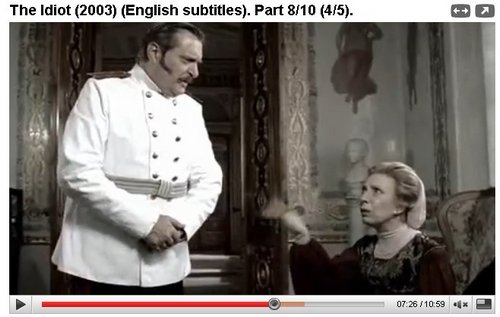It’s not easy to follow the part of the series with Ipollit, partly because I haven’t read the book, and partly because his is not a type we have in our society. He is as self-absorbed as the worst of us baby boomers, but even more of a drama queen. He’s supposed to be dying of what seems to be tuburculosis, though that word isn’t used. Neither he nor the people around him have heard the government regulations about swine flu and how it’s important to cover your coughs, stay away from people when you’re coughing, wash your hands, etc.
I thought about him when I read this Mary Gordon essay at Killing the Buddha about the Prodigal Son (which I found via Arts & Letters Daily). It has to do with the difficulty the older son has in celebrating the younger son’s return, especially when there is some question whether the kid has really learned his lesson and is repentant.
In answer to Ipollit’s question of what’s the most virtuous way for him to die (he seems determined to make a grand spectacle of it) Prince Mushkin says, “You should pass us by and forgive us our happiness.” I don’t know what Ipollit does with that advice — haven’t yet got that far. But it didn’t seem to be the answer he wanted.
What this scene inspired me to do is to finally look for the Russian text on line in a printable version, and an English translation to go with it. I’ve printed the first chapter. Now to try to slog through it. It’ll take a while.


